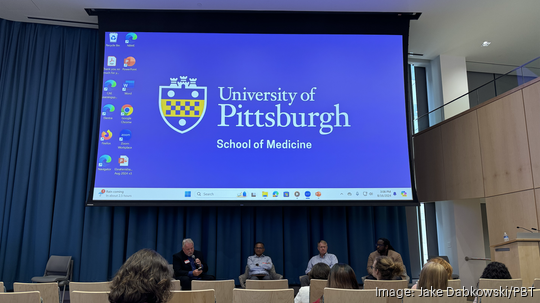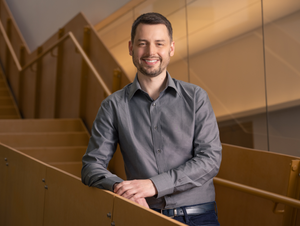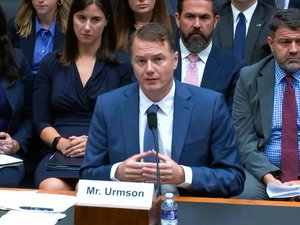
Despite artificial intelligence rapidly changing the world, one sector has struggled to keep pace — health care. A symposium hosted at the University of Pittsburgh today by the Biotechnology Board discussed extensively how the sector can catch up.
Dean of the University of Pittsburgh School of Medicine Anantha Shekhar said that "the pace at which [AI] transforms consumer products versus healthcare is completely different" because of multiple reasons, including higher regulatory standards and data access.
Speaking on the topic of high regulatory standards, Dean of CMU's Heinz College of Information Systems Ramayya Krishnan likened the development of healthcare technologies to stalled progress in the autonomous vehicle industry.
"We are terrible drivers, but we hold the technology to a very different standard," Krishnan said. "Technology will find a way to improve the quality of the experience but society will set the standards."
Shekhar also suggested that the healthcare field has been less likely to embrace AI because the technology is prone to error, referred to by the industry as hallucinations. Knowing how to adequately utilize the technology at scale will require broader education, and even still he suggested that some clinicians are unlikely to embrace the technology until it is further developed.
"You can use AI inappropriately and then blame AI for it doing the wrong thing but it isn't AI's fault that you used it incorrectly," Shekhar said. "It's ultimately the doctor who is going to be liable for everything, which is why adoption is so slow."
The technology also presents a possibility for misinformation en masse - Biotechnology Board conference chair Rema Padman gave a presentation on how the internet has fundamentally changed how humans interact with health information and that a statistical majority of Americans lack proper medical literacy.
"How many of you in this room have accessed Youtube on health related topics? I see a lot of hands," Padman said. "We know in this audience to also go to the Mayo Clinic and other various sites... but the lay person, how do they access this information?"
Padman suggested that those developing patient focused technological resources need to prioritize design and ease of accessibility.
On the development side, Krishnan said that technologies that don't require FDA approval will be able to reach commercial scale quicker. He pointed to Abridge, a Downtown-based company that transcribes conversations between clinicians and patients and has secured sizable funding, as an example of this.
Ultimately, AI models are built on data, something that presents challenges for development access. One barrier is ensuring HIPPA compliance, for example GPT, one of the most used AI technologies, is not HIPPA compliant. But another problem Shekhar said is that "health records are a mess." Different health systems utilize different methods for storing data and records, which presents issues towards scale.
But gathering the data isn't the only problem — access to computational components and energy presents a hurdle, and former Allegheny County Executive Rich Fitzgerald cautioned that as the Pittsburgh region grows as an AI hub, the area will require improved infrastructure to match energy demand.
"AI needs a heck of a lot of data and what data needs is a heck of a lot of electricity and energy," said Fitzgerald, who is now the executive director of the Southwestern Pennsylvania Commission. "We need to make sure that we have a grid system that can provide the infrastructure for our region's continued growth."
But Fitzgerald and other policy makers also said that the region will need to improve its talent retention and attraction in the sector to remain competitive.
"What we lack here is branding," Anand Rao, a distinguished professor of AI at CMU, said. "The work is phenomenal, but that's not really known outside."
Rao suggested that Pittsburgh should try a different message than Silicon Valley. He said that the Valley is "all in on the technology" but that Pittsburgh should focus its messaging less on the technology itself and more the applications of the technology.









